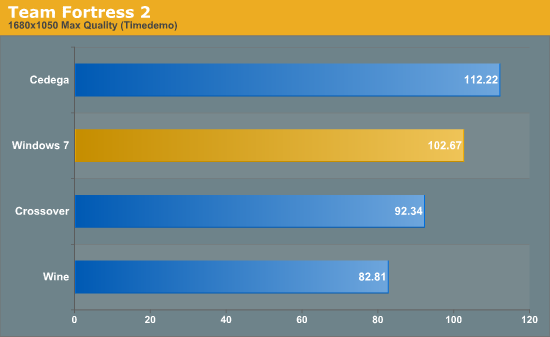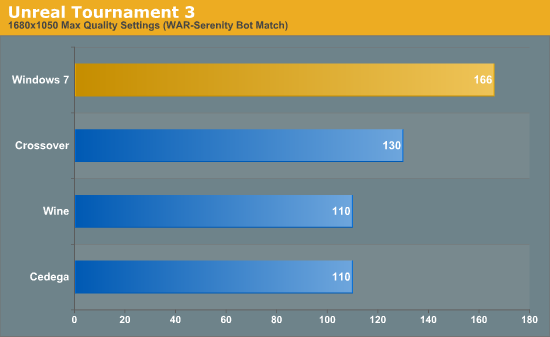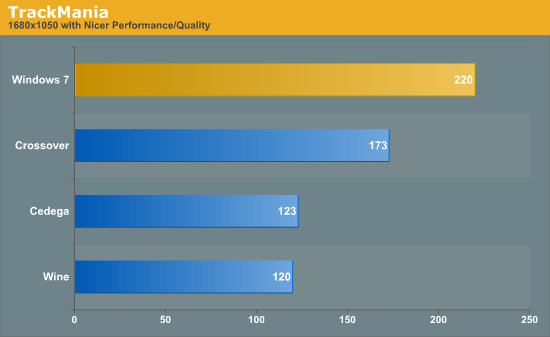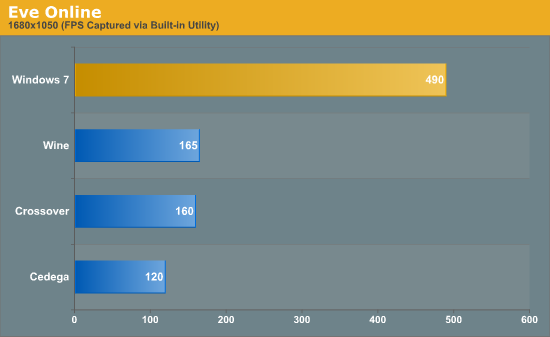Linux Gaming: Are We There Yet?
by Christopher Rice on December 28, 2009 2:00 PM EST- Posted in
- Linux
Linux Gaming Performance
We'll start with a look at games where we were actually able to get results from all three Wine projects. This was no small task, as numerous games worked under one or two options but not all three. We confined our testing to games that were at least rated Bronze (although as noted that doesn't necessarily guarantee success).

We begin with some very interesting and somewhat unexpected results with Team Fortress 2. Here we see an actual performance improvement over Windows with Cedega. Although all of the FPS reported are well above the minimum necessary to play TF2, functionality of play within Wine was not good. We experienced frequent FPS drops and stuttering with Wine when we tested overall functionality. Cedega, Crossover, and Windows all ran smoothly during the functionality testing.

Moving to Unreal Tournament 3, again all the frame rates are well above playable. We did find that on the Linux side, Crossover provided the best in-game experience with no glitches or stutter. Windows worked as expected with no issues to report.

Windows easily beats our Wine projects for overall FPS in TrackMania. Both Windows and Wine projects play this game flawlessly with no graphical glitches or stuttering. This is a case where if you have sufficiently fast hardware, you can run this game on either Linux or Windows without issues.

The results in Eve Online are very interesting. During all our previous benchmarks the Wine projects have been competitive with windows, but Eve Online shows a huge gap. I re-ran all these tests twice to ensure all settings were set exactly the same across tests and came up with the same results. Windows and Linux gameplay ran smoothly with no noticeable stuttering or graphical glitches, though, so this is another game that runs on all platforms. The difference here is that you can potentially run at higher resolutions/settings under Windows and get better performance.










126 Comments
View All Comments
ravaneli - Tuesday, December 29, 2009 - link
I meant the 64-b version of Ubuntu will not install on my RAID0. And even if it did, does Ubuntu support SLI?ChristopherRice - Tuesday, December 29, 2009 - link
What raid controller are you using? And yes nvidia supports sli in linux.ravaneli - Tuesday, December 29, 2009 - link
The motherboard controller, not sure what it is. Gigabyte EP45T UD3LR.Do I need to download and install anything in Ubuntu to enable SLI? Like NVidia driver for Ubuntu?
ChristopherRice - Tuesday, December 29, 2009 - link
Using the on-board fake raid controller?ChristopherRice - Tuesday, December 29, 2009 - link
Tell you what, send me an email and I can get you in information your looking for.ravaneli - Tuesday, December 29, 2009 - link
I tried to look up your email but failed. How do u send an email to a member?ANyway, you are correct. Using the on board Intel raid controller.
I can't install XP without the Intel driver on a floppy too. Is there a similar trick for Ubuntu?
My email is veskovasilev @ yahoo or gmail
ChristopherRice - Tuesday, December 29, 2009 - link
I know your using ubuntu, however arch has an awesome wiki on this. I'm sure some other ubuntu users can grab your specific wiki on installing over fake raid. However below is the link for archlinux fake raid. To be honest you should use software raid rather then fake raid. Although for this article I did use fakeraid to stay true to the setup.http://wiki.archlinux.org/index.php/Installing_wit...">http://wiki.archlinux.org/index.php/Installing_wit...
ravaneli - Wednesday, December 30, 2009 - link
I looked at that and got really scared. If I have to assign a probability to me doing all of this right, it would be below 5%.This is what I don't like in Linux. It is still quite user unfriendly. If you just browse the web and don't need anything other that the programs (good list) it comes with, then it is fine. But any kind if adjustment to a different purpose is a nightmare if you are not a programmer.
Anyway, I thank you sincerely for your help! I will be building a new machine soon, and will use SSD instead of RAID0 for speed, and I will make the dual boot there.
stmok - Tuesday, December 29, 2009 - link
At least the author is a fellow Arch Linux user! ;)As for the feedback around here, its the same thing over and over again. (As with other tech websites).
(1) Most open source devs don't care for mainstream consumers. The software they wrote is made for their needs...They're happy to share it with everyone, and allow modifications/improvements using a community model.
So trying to threaten them with comments like "Linux will never attain Windows marketshare" is pretty much an empty one. They'll just ignore you.
(2) ...Nor do they care for desktop marketshare. Why would they care if its not their business to begin with? Apple and Microsoft are businesses; desktop marketshare means a lot to them. Its their core and they build services/apps around it.
(3) Its "desktop" distro developers like Canonical (Ubuntu), etc that care about the mainstream user's needs. The overall goal of such organizations is to eventually use Linux as a platform for commercial applications sold via online store. (I'm not sure that would work well, as this approach has failed in the past).
(4) Using ONE distro (like Ubuntu) is NOT representative of ALL Linux. To really appreciate Linux; you'd have to delve into distros like Debian, Arch, Gentoo, Sidux, etc. The reason being, no one distro is made EXACTLY the same.
eg:
Arch Linux is a rolling release distro: You get regular updates instead of specific distro version releases. Its main advantage is that changes are gradual over time.
Ubuntu is a point release distro: Its fixed at releasing specific versions of applications. Changes here, are encountered as distinct "bump ups". You'll often end up formating/installing a new release than upgrading because new versions of components can cause weird issues.
(5) Linux will never be for the mainstream user, so get it out of your heads...And it shouldn't bother. That's not its strength.
Linux's real strength is in servers (infrastructure), super computers (clusters), purpose specific systems/workstations, embedded devices, and enthusiasts who prefer what Linux offers and are willing to go through the learning curve.
If you're just a computer user who's doesn't want to endure any learning curve and just want to use a computer; don't bother with Linux. Its best if you shift responsibility to a third party like Microsoft or Apple by paying for their solutions.
Linux brings responsibility to the user. Some folks make not like that, so it really won't work for them.
As for games? Buy a console. :)
haplo602 - Wednesday, December 30, 2009 - link
Amen to that ... finaly a comment worth reading ...